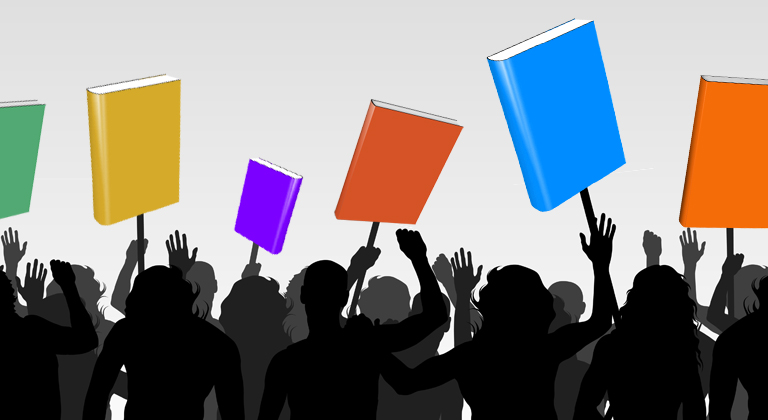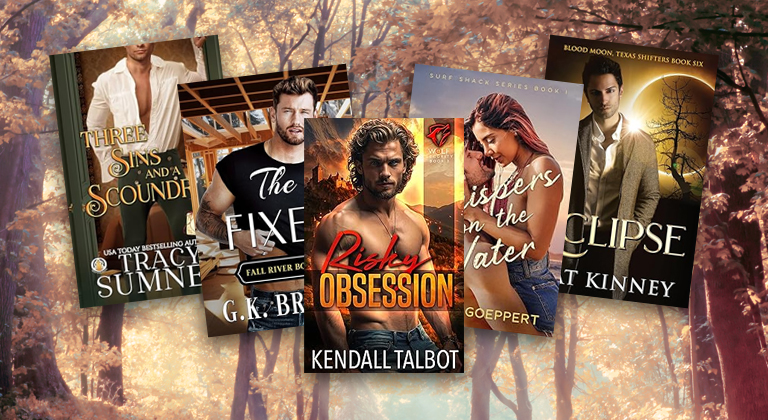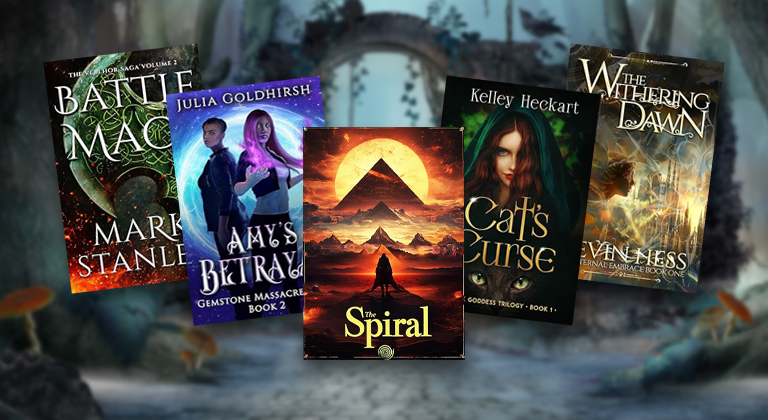Using Fiction as a Protest Against Injustice
In the midst of a world that continues to feel unsettled and divided, the power of storytelling shines as a beacon of hope and change. Authors have a long history of addressing real-life problems through fiction, weaving tales that not only entertain but also provoke thought and inspire action. In today’s blog, Ginger explores the profound impact that literature has historically had in challenging the status quo and the vital role that we, as writers, play in shaping societal perspectives.
Literature has always been a powerful form of protest, especially during times of outrage or when the desire for change burns brightly. By reflecting the world’s injustices and offering a glimmer of hope, these stories resonate deeply with readers, regardless of whether the author is traditionally or self-published. What truly matters is that we harness the power of our words to address the complexities of our times, create works that spark conversation, inspire empathy, and potentially lead to positive change.
One of the most oft-used expressions during the pandemic of 2020 was “we live in unprecedented times.” Unfortunately, it seems like that lack of precedence remains with us! Wherever you stand politically or ideologically, there’s no denying that we continue to live in a tumultuous world and it can be deeply unsettling for everybody.
To many of us, just to survive in this world feels like we have to “pick sides” and even when we do, neither side is without its own injustices. It’s a troubling time to be alive. The daily news leaves us feeling helpless and frustrated, and cruelty and danger seems to lurk around every corner. The worst part? The power to make any difference at all always feels frustratingly out of reach.
But as self-published authors, we’re not as powerless as we might imagine ourselves to be. We possess the incredible ability to weave stories, and many of those could be used to address real-life problems in a fictional setting.
But can our words truly make a dent in the world’s problems?
I argue that the answer is a resounding yes. History and literature have shown us time and time again that writing can be an incredibly powerful form of protest – and a way for writers to channel their frustrations and perhaps even ignite a fire for change.
This isn’t even a new concept! Throughout history, some of the most celebrated authors channeled their outrage at the world into stories that challenged the status quo. Take one of my favorite writers, for example – Ernest Hemingway. Disillusioned by the rise of fascism in Europe, he volunteered as an ambulance driver during the Spanish Civil War. His experiences there would later influence his classic novel For Whom the Bell Tolls – a poignant exploration of war’s brutality and the fight for freedom.
Likewise, George Lucas’s iconic Star Wars saga wasn’t just a space opera. The original trilogy of films were a thinly veiled allegory for the Vietnam War. The corrupt Galactic Empire represented an oppressive and militaristic regime, while the ragtag band of rebels mirrored the spirit of resistance. Lucas himself has acknowledged the film’s anti-war themes, highlighting the power of fiction to reflect real-world issues. Injustice, after all, transcends time and place.
Great literature has always been a testament to this belief. Harper Lee’s To Kill a Mockingbird stands as an enduring protest against racial prejudice in America. Through the innocent eyes of Scout Finch, Lee exposes the deep-seated racism that plagued the South in the 1930s. The novel’s power lies in its portrayal of courage and compassion in the face of bigotry, despite the consequences that Finch and his family faced for doing the “right thing.”
Joseph Heller’s Catch-22 took a similar aim at the absurdity of war. Set during World War II, the novel satirizes the military bureaucracy and the senselessness of violence. Through the experiences of the protagonist, Captain Yossarian, Heller exposes the dehumanizing nature of war and the psychological toll it takes on soldiers. The phrase “Catch-22” has now become part of our everyday lexicon – used to refer to any paradoxical situation from which there’s no escape. It arises due to contradictory rules or limitations that make any attempt to resolve the problem impossible – such as Captain Yossarian wanting to plead insanity to escape military service, despite the fact that recognizing the insanity of war proved he was sane enough to fight in it.
Catch-22 is famous for its real-world setting. However, dystopian fiction has commonly offered another powerful form of protest against real-world injustice.
George Orwell’s chilling 1984 is more relevant today than ever, for example. The book paints a picture of a grim future dominated by a totalitarian government that controls every aspect of human life. Orwell’s work warns against the dangers of censorship, surveillance, and the erosion of individual freedoms – and those of us witnessing government censorship, control of the media, and violent responses to peaceful protests might find those warnings more prescient than ever.
Similarly, Aldous Huxley’s Brave New World explored the chilling possibilities of a future society built on genetic engineering and social control, both of which have come to pass in the form of gene-sequencing and government-curated social media.
When they were originally published, both novels served as a stark warning about the potential consequences of unchecked power and the erosion of human values. Today, many of us believe we’re seeing those consequences come to pass.
Another book that seems more relevant today than ever is Margaret Atwood’s The Handmaid’s Tale, which confronted the oppression of women under a totalitarian regime. The novel’s chilling portrayal of a dystopian future in which women are stripped of their autonomy serves as a powerful protest against gender inequality and the erosion of women’s rights – an erosion many say was demonstrated by the Supreme Court’s recent decision to overrule Roe Versus Wade, the case which had protected a woman’s right to have an abortion for nearly fifty years.
The fact that these books remain relevant to this day – in fact, brought up uncomfortably frequently when discussing current affairs – proves something: That the beauty of writing as a form of protest is as powerful as ever.
I’d argue that beauty lies in an author’s ability to address complex issues in creative and accessible ways. By creating fictional worlds, writers can tackle sensitive topics with enough distance to make them digestible for a wider audience. This allows for critical reflection and discussion of controversial issues without alienating readers or challenging their preconceived beliefs too directly.
So, as a self-published author, you need to recognize the power you have. Now is not the time to feel helpless or disenfranchised. As writers, we have the unique opportunity to share stories that resonate with the issues that trouble us and empower those who share our sense of justice.
And isn’t that the whole point of why many of us became writers? As uncomfortable as it may get, we literally can’t just shy away from tackling the injustices we see in the world every day. You’re burdened with the duty to write stories that challenge the status quo, give voice to the marginalized, and to offer hope in a seemingly hopeless world.
Doing so makes things better – not just for you as a writer, but also for those who read your work. Remember, your readers may share your frustrations with the world. They might be craving stories that acknowledge the darkness you both recognize, but ultimately offer a glimmer of light at the end of a tunnel of hope. As an author, only you can provide that light – and you do so through the power of your words.
So, in the face of a seemingly unfixable world, shoulder the burden with grace. Write stories that offer a glimpse of a world you yearn for. Write the happy endings that can’t exist in real life – recounting the triumphs over injustice, the victories for the downtrodden, and the rewards for staying true to your beliefs.
Your stories might not change the world overnight, but they can spark conversations, inspire empathy, and plant seeds of change within your readers – and that, my fellow authors, is a protest worth writing for.
Do your books reflect real-world issues and problems? If so, we’d love to hear about them – and the struggles you faced putting those words on the page. Tell us about them in the comments section below!












Thank you for this wonderful blog. Injustice, and how to fight it, inspires me as much as the writing itself. As an example, my first book, Adam’s Witness, is an evaluation of homophobia and its terrible consequences, melded into a mystery/police procedural. I included a love story (well, two) to demonstrate what love should look like. Several reviewers objected to my inclusion of gay characters or my so-called “promotion of the lifestyle.” Book two demonstrates how and why women go missing/are murdered, and how *some social constructs not-so-inadvertently open the door to serious abuse. Finding the right voices and avoiding appropriation are difficult sometimes. Staying focused on everyone’s humanity, sometimes including the villains’, as well as avoiding stereotypes, I hope has helped me navigate these issues.
Thank you for this wonderful blog. Such an important topic. Injustice, and how to fight it, inspires me as much as the writing itself. As an example, my first book, Adam’s Witness, is an evaluation of homophobia and its terrible consequences, melded into a mystery/police procedural. I included a love story (well, two) to demonstrate what love should look like. Several reviewers objected to my inclusion of gay characters or my so-called “promotion of the lifestyle.” Sometimes, this writing gig is not for the faint-hearted. Book two (Broken Through) demonstrates how and why women go missing/are murdered, and how *some social constructs not-so-inadvertently open the door to serious abuse. Finding the right voices and avoiding appropriation are difficult sometimes. Staying focused on everyone’s humanity, sometimes including the villains’, as well as avoiding stereotypes, I hope has helped me navigate these issues.
The erosion of women’s reproductive rights led me to write my newest novel, The Correct Order. In my imagined future, women are in control and men are learning how terrifying it can be to have no control over one’s own body. It may not change the world, but it will hopefully make people think about what happens when we live in extremes.
https://a.co/d/0e5M6KpB
I have found writing about social justice and injustice quite rewarding. While my legal thrillers and other novels (please visit http://www.markmbello.com) have not yet been financially sucessful, they have been critically acclaimed, personally satisfying, and a perfect post-law practice career endeavor. I would be pleased to discuss the experience in more detail. Regards, Mark
I took a break from some other genres to explore the age-old concept of a totalitarian regime re-writing history according to its prevailing orthodoxy of cultural and demographic replacement, within a fantasy setting.
‘The Arisendia Chronicles’ was a labour of love I never did much with after publication. Even so, I’ve received the odd message of appreciation from readers who ‘got it,’ and appreciated a change from the usual sword and sorcery fare.
https://www.amazon.com/dp/B0BJ363Z6J?binding=kindle_edition&searchxofy=true&ref_=dbs_s_aps_series_rwt_tkin&qid=1718990984&sr=8-1
When Margaret Atwood wrote The Handmaiden’s Tale she did her research in Iran, a totalitarian regime which was reducing the freedom of women daily. Unfortunately, this has actually got worse and Iran is now joined by Afghanistan and others for the reduction of women’s rights. People everywhere need to learn from these examples both in fiction and in everyday life how quickly freedom can be lost. The warnings are here. We need to heed them.